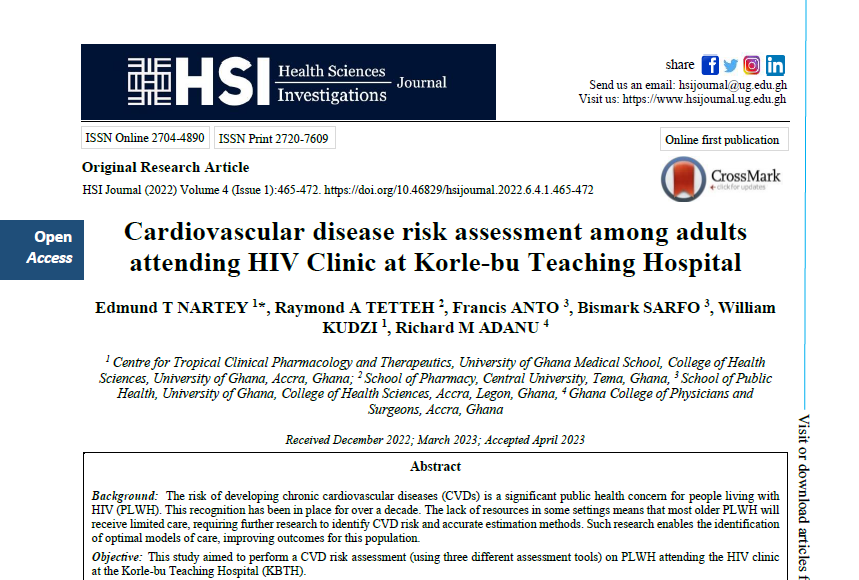Cardiovascular disease risk assessment among adults attending HIV Clinic at Korle-bu Teaching Hospital
Cardiovascular disease risk assessment among adult persons living with HIV
Abstract
Background: The risk of developing chronic cardiovascular diseases (CVDs) is a significant public health concern for people living with HIV (PLWH). This recognition has been in place for over a decade. The lack of resources in some settings means that most older PLWH will receive limited care, requiring further research to identify CVD risk and accurate estimation methods. Such research enables the identification of optimal models of care, improving outcomes for this population.
Objective: This study aimed to perform a CVD risk assessment (using three different assessment tools) on PLWH attending the HIV clinic at the Korle-bu Teaching Hospital (KBTH).
Methods: A hospital-based cross-sectional study involving 311 PLWH was conducted at the HIV Clinic of the KBTH using a questionnaire adopted from the WHO STEPwise approach to chronic disease risk factor surveillance. Blood pressure, anthropometric measurements and fasting blood samples were taken for metabolic/biochemical parameters. A retrospective chart review of clinical folders for HIV and ART-related data was done. To determine the level of risk for cardiovascular disease (CVD), three estimation methods were used: the 10-year Framingham risk score (FRS), the 10-year WHO/International Society of Hypertension (ISH) risk prediction chart, and the 5-year Data Collection on Adverse Effects of Anti-HIV Drugs (D:A:D) cardiovascular risk score.
Results: The estimated 10-year moderate to high risk of CVD was 20.6% using the FRS, 13.2% using the WHO/ISH risk score, and 52.4% using the D:A:D score. The majority of study participants were classified as having a low risk of cardiovascular disease (CVD) according to the FRS and WHO/ISH scoring systems. However, the D:A:D cardiovascular scoring system identified that over 50% of the participants were at a moderate to high risk of developing CVD.
Conclusion: This study indicates that when using the D:A:D risk assessment system, over 50% of the individuals who participated were found to have moderate-to-high risks of CVD. This underscores the importance of conducting a cardiovascular risk assessment before initiation of antiretroviral therapy as well as regular assessments to promptly identify and manage these risk factors, thereby aiding in preventing the occurrence of cardiovascular events. Additionally, the findings highlight the need for CVD management to be included in the HIV clinic.


